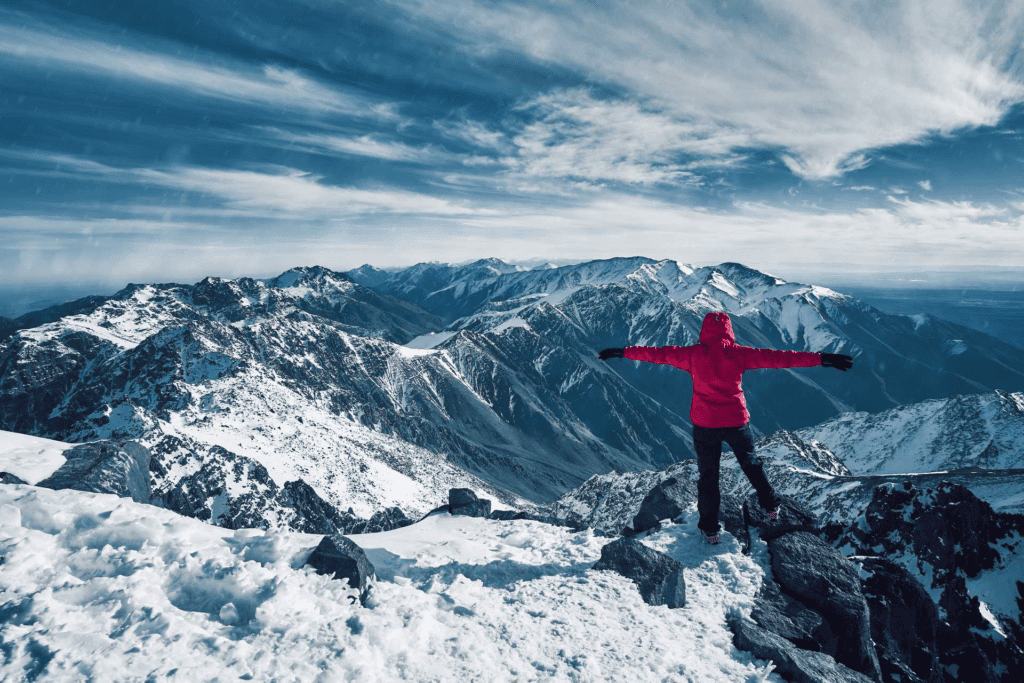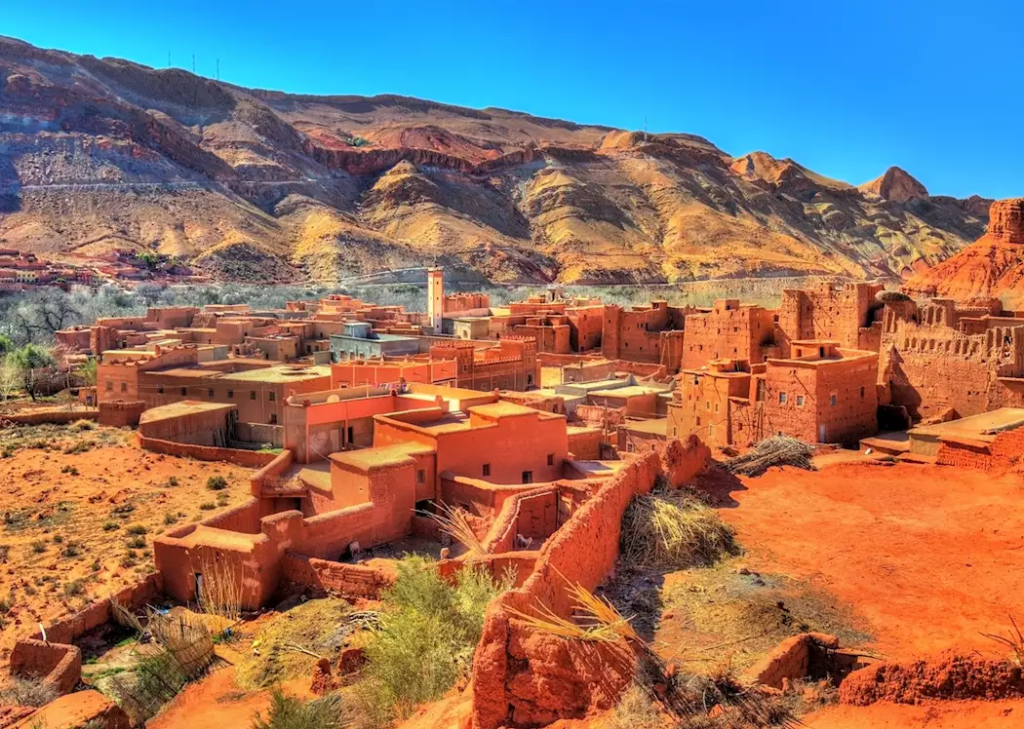Unveiling the Enchanting Beauty of Morocco’s High Peaks and Desert Landscape
Introduction
Morocco, a land of vibrant culture and breathtaking landscapes, has always been a dream destination for travelers seeking a unique blend of adventure and enchantment. While the bustling markets of Marrakech and the historic streets of Fez hold their allure, there’s another world waiting to be explored beyond the cities – the Atlas Mountains. In this article, we invite you to embark on a journey that delves deep into the heart of Morocco’s wilderness. We’ll guide you through the art of hiking in the Atlas Mountains, where the stark beauty of the desert meets the rugged majesty of the high peaks.
The Atlas Mountains, stretching across Morocco, are a geological marvel that has lured adventurers for centuries. Whether you’re an experienced trekker or just starting to explore the world of hiking, this region offers something for everyone. From the fertile valleys adorned with traditional Berber villages to the arid, awe-inspiring desert landscapes, this article will unveil the hidden treasures and challenges of hiking in Morocco’s Atlas Mountains.
Exploring the Diverse Landscapes
High Peaks and Rugged Terrain
The Atlas Mountains are divided into three main ranges: the High Atlas, Middle Atlas, and Anti-Atlas. The High Atlas is the most famous among trekkers and hikers, known for its towering peaks, including Toubkal, North Africa’s highest point. With an elevation of 4,167 meters (13,671 feet), conquering Toubkal’s summit is a dream come true for any mountain enthusiast.

The hike to Toubkal’s summit is challenging, but the reward is an unparalleled panoramic view of the surrounding landscapes. The trekking trails take you through rocky terrain, lush valleys, and narrow gorges. Along the way, you’ll pass by quaint mountain villages where the hospitality of the Berber people will warm your heart.
Desert Oases and Gorges
While the High Atlas dominates the northern part of Morocco, the Anti-Atlas to the south offers a striking contrast. Here, you’ll find yourself amidst the breathtaking beauty of desert landscapes, dotted with oases and dramatic gorges.
One of the most famous routes in the Anti-Atlas is the Todra Gorge trek. The towering limestone cliffs rise dramatically on both sides, creating a narrow corridor for hikers. The Todra River has carved this gorge over millions of years, and as you walk through it, you’ll feel dwarfed by the sheer scale of nature’s artwork.

The contrasting landscapes of the Atlas Mountains are a testament to Morocco’s incredible natural diversity. From snow-capped peaks to arid deserts, this region has it all.
The Trails Less Traveled
Hiking Routes and Options
Hiking in the Atlas Mountains offers a multitude of trails catering to all levels of trekkers. Whether you’re a seasoned hiker or a beginner, there’s a route that suits your preferences.
1. Toubkal Ascent (Advanced)
For experienced trekkers seeking an adrenaline rush, the Toubkal Ascent is the ultimate challenge. This multi-day trek takes you to the summit of Jebel Toubkal, providing you with breathtaking views and a profound sense of accomplishment.
2. Atlas Valley Discovery (Intermediate)
If you prefer a more leisurely hike that allows you to immerse yourself in the local culture, the Atlas Valley Discovery route is perfect. You’ll explore charming Berber villages, learn about their traditions, and enjoy stunning valley views.
3. Desert Expedition (Beginner)
For beginners, the Desert Expedition offers a taste of the Atlas Mountains’ unique desert landscapes. This trek includes visits to desert oases, camel rides, and the opportunity to witness the mesmerizing Sahara sunset.
Guided Tours vs. Independent Hiking
Choosing between a guided tour and independent hiking depends on your preferences and experience level. Guided tours provide the convenience of an experienced guide who knows the terrain, culture, and language. They also handle logistics like accommodations and meals. Independent hiking allows for more flexibility but requires thorough planning and self-sufficiency.
Packing Essentials for Your Journey
Hiking in the Atlas Mountains demands the right gear and preparation. Here’s a checklist of essentials to ensure a safe and enjoyable trek:
Clothing:
- Layered clothing: Be prepared for temperature fluctuations by wearing multiple layers that can be easily added or removed.
- Waterproof and windproof jacket: Protect yourself from unexpected weather changes.
- Sturdy hiking boots: Ensure your boots provide ankle support and are comfortable for long walks.
- Hat and sunglasses: Shield yourself from the sun’s rays.
Gear:
- Backpack: Choose a comfortable, well-fitting backpack to carry your essentials.
- Water purification: Carry a water filter or purification tablets to access clean drinking water during the trek.
- Trekking poles: These provide stability and reduce the strain on your knees during descents.
- Sleeping bag and mat: Essential for overnight treks or staying in mountain huts.
Nourishment:
- Energy snacks: Pack high-energy snacks like nuts, dried fruits, and granola bars.
- Water bottles: Carry enough water to stay hydrated throughout the hike.
- Reusable cutlery and food containers: Minimize waste and be eco-friendly.
Navigation and Safety:
- Maps and compass: Even if you have a guide, having basic navigation skills and tools is crucial.
- First aid kit: Include essentials like bandages, antiseptic wipes, and pain relievers.
- Headlamp or flashlight: Don’t forget extra batteries.
Cultural Encounters and Hospitality
One of the most captivating aspects of hiking in the Atlas Mountains is the opportunity to interact with the indigenous Berber people. These hospitable mountain dwellers have inhabited the region for centuries, preserving their traditions and way of life.
As you traverse through Berber villages, you’ll have the chance to learn about their unique culture, sample traditional cuisine, and witness their vibrant dances and music. The warm welcome extended by the Berber communities will leave a lasting impression on your journey.
Accommodations in the Atlas Mountains
Accommodation options in the Atlas Mountains vary, catering to different preferences and budgets. Here are a few options to consider:
Mountain Huts (Refuges)
For trekkers planning multi-day hikes, mountain huts, or refuges, provide basic accommodations along the trail. These huts offer shelter, communal dining, and often breathtaking views of the surrounding landscapes. It’s advisable to book refuges in advance during peak trekking seasons.
Guesthouses (Gîtes)
In many Berber villages, you’ll find charming guesthouses known as gîtes. These provide a more authentic and cultural experience. You’ll have the chance to interact with locals, savor homemade meals, and gain insights into Berber life.
Luxury Lodges and Resorts
For those seeking a touch of luxury in the midst of the wilderness, several high-end lodges and resorts are nestled in the Atlas Mountains. These accommodations offer comfortable rooms, fine dining, and spa facilities.
Navigating the Terrain and Staying Safe
While the Atlas Mountains offer unparalleled beauty, they can also present challenges. It’s essential to prioritize safety during your trek. Here are some tips to ensure a safe journey:
Weather Awareness
Morocco’s mountains are known for their unpredictable weather. Check the weather forecast before starting your trek, and be prepared for sudden changes in temperature, precipitation, or wind.
Altitude Considerations
If you’re trekking to high altitudes, be aware of the symptoms of altitude sickness, such as headache, nausea, and shortness of breath. Acclimatize gradually and stay hydrated.
Navigation Skills
Even with a guide, having basic navigation skills can be a lifesaver. Familiarize yourself with the trail, use maps and compasses, and know the landmarks along the route.
Travel Insurance
Ensure you have adequate travel insurance that covers hiking and trekking activities, including emergency medical evacuation if needed.
Emergency Contacts
Carry a list of emergency contacts, including local authorities, your embassy or consulate, and your trekking company (if applicable).
Preserving the Atlas Mountains
As responsible travelers, it’s essential to leave the natural beauty of the Atlas Mountains unspoiled for future generations. Follow the principles of “Leave No Trace” to minimize your impact on the environment:
- Pack It In, Pack It Out: Take all your trash with you, including food wrappers and used toiletries.
- Stay on Marked Trails: Avoid trampling on fragile vegetation and disturbing wildlife.
- Minimize Campfire Impact: Use a camp stove for cooking instead of making fires.
- Respect Wildlife: Observe animals from a distance and never feed them.
- Be Considerate of Other Hikers: Keep noise levels down and yield the trail to others when necessary.
By following these principles, you can help protect the fragile ecosystems of the Atlas Mountains.
Conclusion
Hiking in Morocco’s Atlas Mountains is a transformative experience that immerses you in the diverse beauty of this enchanting country. From the soaring peaks of the High Atlas to the tranquil oases of the Anti-Atlas, each step reveals a new facet of Morocco’s natural and cultural heritage.
As you plan your expedition to the Atlas Mountains, remember to prepare adequately, respect the environment, and embrace the hospitality of the Berber people. Whether you seek adventure, cultural immersion, or simply a break from the hustle and bustle of daily life, the Atlas Mountains offer it all, making this journey a memorable chapter in your travel story.
So, lace up your hiking boots, grab your backpack, and get ready to traverse the desert trails and high peaks of Morocco’s Atlas Mountains. Your adventure awaits!
Disclaimer: The information provided in this article is for informational purposes only. Always consult with local authorities, guides, and experts before embarking on any hiking or trekking adventure.
- Toubkal Trek Details
- Atlas Valley Discovery
- Desert Expedition
- Leave No Trace Principles
- Top 10 Hiking Destinations in the World
- Cultural Immersion: Traveling Through Morocco’s Berber Villages
- Sahara Desert Safari: A Journey into the Heart of the Dunes
These links provide valuable information related to hiking in the Atlas Mountains and additional resources for readers who want to explore further.
